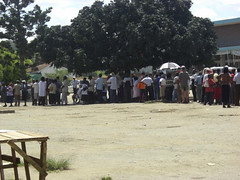Live from Zimbabwe election day
 7am – Umwinsidale, Harare
7am – Umwinsidale, Harare
Arrived at the polling station, a large marquee in a field between the Redale petrol station and the local police outpost, just after 7am to find a short queue of about 10 people waiting to vote. Loitering outside was a chap wearing a yellow jerkin which read Regional Faith Observer but when asked he turned out to be a Zimbabwean national.
A further seven unidentified people, supposedly observers, sat side by side along a bench outside the entrance to the tent with a man posted at the doorway, calling in the voters one at a time and checking their Zimbabwean ID cards before allowing them inside.
Inside along the left-hand wall of the marquee there was another row of six or seven people sitting on a bench watching events, while at right angles to them were set a group of six desks or tables placed side by side. The polling officer at the first desk looks up the voter’s name on the electoral register, checks it matches the person’s ID card and then underlines the name.

At the second desk the voter collects a presidential ballot paper which the polling officer folds in half as an example. At the third desk the voter collects the ballot for the Senate elections, at the fourth, the ballot for the parliamentary elections and at the fifth the ballot for the council elections. At the sixth desk the voter is asked to dip the left little finger into a pot of pink ink.
At right angles to the desks (now on the third side of the square of the tent iare set three cardboard booths, about six feet high, in which the voter can mark each ballot paper with a cross. Once this is done, the voter emerges with four ballots folded in half, all slightly different in colour ready to put in their individually-marked ballot boxes, where there is another official to confirm that each paper is put in the correct box. The four ballot boxes are Perspex and transparent, each clearly marked.
On the way out of the tent was a desk with another man, purpose unknown. There was no uniformed policeman inside and the one patrolling outside did not enter when a disabled lady (arms foreshortened from thalidomide) entered. Although this lady (Sandy) has on previous elections been on the electoral roll for this ward and has always voted in this place, she was told her name wasn’t on the roll and she must go elsewhere. She tried to complain to the observers both inside and outside the tent, but no-one paid any attention or took any note of her complaint.
So the voting process at this polling station appeared entirely in line with international standards for a free and fair vote albeit that at least one voter feared being disenfranchised from the absence of her name on the electoral roll. However, as another voter commented: this isn’t where the rigging takes place, it’s the count and the tally which need the closest scrutiny.
